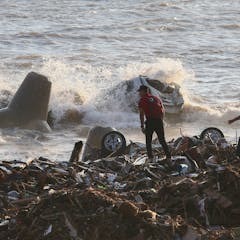
Articles on Climate finance
Displaying 1 - 20 of 80 articles

Kenya, Ethiopia, Djibouti, South Sudan and Uganda are investigating whether deep groundwater bores could support drought stricken communities. Could a networked approach help?

Katherine Browne and Margaret Angula talk to The Conversation Weekly podcast about a UN pilot in Namibia that’s pioneering community-led climate adaptation.

A focus on economic stability in the near-term makes the climate crisis worse in the long-term.

The UN climate conference brought some progress. A former UN official who has been involved in international climate policy for years explains what has to happen now for that progress to pay off.

Even with rapid reductions in emissions, we will still need to adapt to a harsher climate.

Weak language at COP28 is at complete odds with the officially-recognised science.

COP28 was Africa’s ‘most vocal COP ever’. African leaders’ assertiveness paid off with new climate finance deals being struck.

When forest communities have secure rights and tenure, the results can be miraculous.

As Climate Change and Energy Minister Chris Bowen lands in Dubai for COP28, Australia has announced an extra A$150 in climate finance with a focus on the Pacific region.

South Africa’s plan to transition to green energy may eventually benefit big private companies more than ordinary citizens.

Funding climate adaptation in conflict areas may require engaging local communities and armed groups where national governments are absent.

Through the Loss and Damage Fund, developed states and major emitters will compensate developing countries experiencing the most devastating effects of climate change. The fund is now operational.

Africans need to re-envision what climate resilient development means within unique African city contexts.

Climate finance can help developing countries adapt to climate change and phase out their emissions.

COP28 gives Nigeria another chance to fight for financing it needs to adapt to climate change.

Rich polluters have evaded any notion of compensating poor countries at the UN talks.

Massachusetts is establishing the first US green bank dedicated to sustainable affordable housing. Three experts in climate finance explain why better housing can help rein in global warming.

It’s a crucial time for the World Bank, with growing calls for reform and sky-high expectations of what one leader needs to do. A former World Bank official explains the challenges ahead.

Russia tried to weaponize energy to keep European nations from opposing its war in Ukraine, but the real pain from Putin’s actions and Western sanctions has been felt far from Europe.

We can be much better at exploiting finance and economics to tackle climate change.
